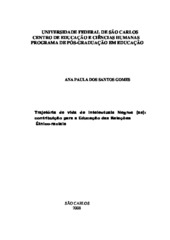Trajetória de vida de intelectuais negros (as) : contribuição para a educação das relações étnico-raciais
Abstract
The research presented here is inserted in the context of the deployment of Parecer CNE/CP/003/2004, which aims to attend the purposes indicated in CNE/CP 6/2002, which regulates the Law 10.639/2003. The objective is to contribute with the education of ethnical-racial relations making known and valued the life experiences and contributions of intelectual black scholars; experiences considered patrimony of the black comunity. The theorical references in this investigation bring discussions about intelectuals, black intelectuals, racial discrimination, valorization of African originated culture, patrimonial education, memory of black scholars, cultural patrimony. The matter of research that guides this study is: What educational processes, that are present in black people life trajectory, fashion them as black scholars? I search to know, through the report of situations lived by black scholars, research colaborators, how were they becoming intelectuals, how did they overcome obstacles and how they constituted themselves professionals in society without, however, lose sight of their ethnical-racial origin and their culture of African matrix. In the activity of registring the trajectory of black scholars life, I sought to observe the educational processes that were developed in their professional practices, of militance in contact to people surrounding them, be it in family, at work, in the community, among other environments. In life oral reports, collected in semi-structured interviews, I try to identify meanings in the experience of becoming a black scholar. The analysis of data was done under the form of a comprehensive description based on Fenomenology, in this process, I search for highlighting educational processes in which the research collaborators participated in different spaces in their lives: work, family, community. In these spaces, the black intelectuals built meanings and representations of their lives. They built their history and along with their target community, they rebuilt and rebuild the history of brazilian black people. Their life experiences reveal cultural, familiar and moral values that guide their lives. They point possible ways of racial discrimination superation and the conquest of fight and denounce spaces. They encourage the younger to keep with the black struggle aiming for equality and justice for the black people.
